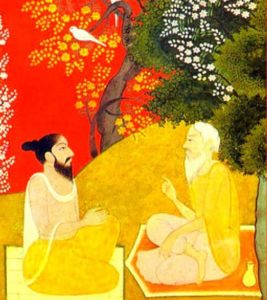
Table of Contents
hide
The Law of Sacrifice
The word sacrifice comes from two Latin words, sacer, “sacred,” and facere, “to make”; hence, to make sacred. Sacrifice means to offer anything to a deity out of respect or for goodwill to continue. It also means to give up, destroy or forgo something of value for the sake of something that has greater value or that has a more pressing claim. Indeed, what is most primal in man but the image and energy of Spirit within him? Man’s original instincts, his most powerful primal urges, are of Spirit as divine elements within him. To sacrifice, then, to offer or give up some valued thing to God or to others with a more pressing claim, is a primal urge within us that cannot, in the end, be denied. Just witness parents. human or animal, protecting their offspring: when danger strikes suddenly, blindingly quick reflexes act to save the young ones. In such instances, the law of sacrifice is clearly demonstrated. The Hindu Chandogya Upanishad states simply, “Man is sacrifice.” If the law of sacrifice is so embodied in us, let us get a clear picture of what to sacrifice and how to sacrifice. Since God created all things perfect and, therefore, holy, we cannot make a tree or a mountain or ourselves more sacred than they or we originally and innately are.
Man cannot make God holier than God already is, although God knows we have tried. However, we can correct erroneous thoughts, desires and actions that have caused all of the desecration in the natural world and in mankind.
Often, we shy away from acts of sacrifice because we know we are going to suffer some negative consequence. True, we usually do suffer when we sacrifice. But suffering is connected with the error we are trying to remove and not with the principle of sacrifice. There is no intrinsic relationship between suffering and sacrifice. Sacrifice is a divine law of God. God is good and holy and just. So, it is an error to think that acts of sacrifice cause our suffering. This would be to blame God for our suffering. This is never the case. God is not evil. In truth, we suffer because we do not sacrifice; that is to say, we fail to live this divine law by not making all of our thoughts, feelings and actions sacred.
A beautifully poetic description of sacrifice is found in Taoist scripture. Here are two translations of the same verse: “Turning back is how the way moves.” “Returning is the motion of the Tao.” Turning back—returning to the less advanced and less fortunate—not only is a duty here on Earth but also is the way of the universe.
For those who know this, turning back is not a self-centered act. We return not because we know that humankind can only evolve together as a race, though this is true. We turn back not because we know we will incur good karma by doing so, though this also is true.
We sacrifice our energy and incarnation not because we know we will receive more from Spirit than we will ever give, though this, too, is true. We share our lives because we see the needs of others and respond without a thought for ourselves.
The Hindu Chandogya Upanishad states simply, “Man is sacrifice.” If the law of sacrifice is so embodied in us, let us get a clear picture of what to sacrifice and how to sacrifice. Since God created all things perfect and, therefore, holy, we cannot make a tree or a mountain or ourselves more sacred than they or we originally and innately are.
Man cannot make God holier than God already is, although God knows we have tried. However, we can correct erroneous thoughts, desires and actions that have caused all of the desecration in the natural world and in mankind.
Often, we shy away from acts of sacrifice because we know we are going to suffer some negative consequence. True, we usually do suffer when we sacrifice. But suffering is connected with the error we are trying to remove and not with the principle of sacrifice. There is no intrinsic relationship between suffering and sacrifice. Sacrifice is a divine law of God. God is good and holy and just. So, it is an error to think that acts of sacrifice cause our suffering. This would be to blame God for our suffering. This is never the case. God is not evil. In truth, we suffer because we do not sacrifice; that is to say, we fail to live this divine law by not making all of our thoughts, feelings and actions sacred.
A beautifully poetic description of sacrifice is found in Taoist scripture. Here are two translations of the same verse: “Turning back is how the way moves.” “Returning is the motion of the Tao.” Turning back—returning to the less advanced and less fortunate—not only is a duty here on Earth but also is the way of the universe.
For those who know this, turning back is not a self-centered act. We return not because we know that humankind can only evolve together as a race, though this is true. We turn back not because we know we will incur good karma by doing so, though this also is true.
We sacrifice our energy and incarnation not because we know we will receive more from Spirit than we will ever give, though this, too, is true. We share our lives because we see the needs of others and respond without a thought for ourselves.

